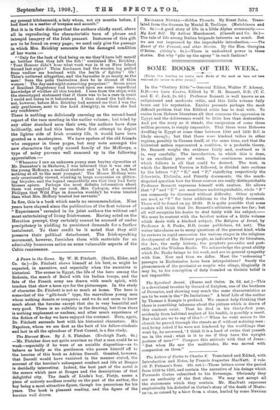SOME BOOKS OF THE WEEK.
[Under 11.is hearring we notice such Books of the week as hare not been reserved for review in other forms.] In the "Century Bible "— General Editor, Walter F. Adeney, D.D.—we have Exodus, Edited by W. H. Bennett, D.D. (T. C. and E. C. Jack, 2s. 6d.) Professor Bennett is well known as an enlightened and moderate critic, and this little volume fully bears out his reputation. Exodus presents perhaps the most difficult problem that the Biblical critic has to deal with. To excise from Hebrew literature all that concerns the oppression in Egypt and the deliverance would be little less than destructive. And yet the story as it stands, the emigration of some three million persons, is simply impossible. That there were Hebrews dwelling in Egypt at some time between 1500 and 1200 B.C. is likely enough ; but that there were kindred tribes in other regions, possibly in Canaan itself, at the same time, and that the historical nation represented a coalition, is a probable theory. Dr. Bennett weighs the evidence fairly and, confused as it is, very carefully. The introduction, in which this is done, is an excellent piece of work. The continuous annotation which follows is all that could be desired. The text, in which the Revised Version is followed, is divided into sections by the letters "J," "E," and "P," signifying respectively the Tehovistic, Elobistic, and Priestly documents. On the much- disputed question how far these sources are really distinguishable Professor Bennett expresses himself with caution. Ho allows that "T" and " E " are sometimes undistinguishable, whole "P " can commonly be discerned without difficulty. Other symbols aro used, as " S " for later additions to the Priestly document. These will be found on pp. 29-30. It is quite possible that some readers will think that Dr. Bennett's criticism goes too far ; but all will recognise his desire to deal fairly with his subject.— We must be content with the briefest notice of a little volume which deals with a kindred subject, The Religion of Israel, by Professor A. S. Peale, D.D. (same publishers, 6d. net). The writer introduces us to many questions of the gravest kind, while be reviews in rapid succession the various stages in the religious development of the Hebrew people, as indicated by its literature, the law, the early history, the prophets pre-exilic and pod- exilic, and the Wisdom Books. We acknowledge the great ability which Dr. Peale brings to his work, and are in general sympathy with him. Now and then we differ. Must the "redeeming" passages in Ecclesiastes have been interpolations? Surely the phenomenon of the pessimist or sceptic who clings, illogically it may be, to his conception of duty founded on theistic belief is not impossible.










































 Previous page
Previous page